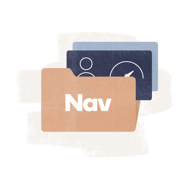Over the years I’ve tried to be a “morning person.” From morning exercise, to meditation, to “Bulletproof coffee,” I’ve tried any number of tricks to get me going early.
But it hasn’t worked. My lack of morning early enthusiasm earned me the nickname “sunshine” at one job (even after that 6 a.m. workout), and led to general dissatisfaction at another. More importantly, my attempts to start my day bright-eyed and bushy-tailed have left me feeling guilty and frustrated, worried I’d be trapped in mediocrity at a significant disadvantage to my early rising peers.
But recently two things have completely changed my perspective and left me feeling happier and more productive than I have in a long time.
The first: I stopped trying to be a morning person. I landed a job with Nav, helping small business owners understand and build strong business credit. And while I love the work and the company culture, I was surprised by how much I love the schedule.
Nav’s offices are based in Utah and California, in the mountain and pacific time zones respectively. But I continue to work remotely from the eastern time zone. Suddenly 10 am for me—a time where I find my brain is really ready to dive into serious work—isn’t late; it’s early compared to my colleagues. (Before then, I often tackle more mindless work such as catching up on email or industry news.) And though that means I often find myself responding to email or Slack messages at 7 pm my time (4 pm in our San Mateo office), I don’t mind. I still feel productive well into the early evening.
The second: I let myself off the hook for not being an early bird. I read Dr. Michael J. Breus’s book, The Power of When, and discovered that my sluggishness before 8 am is likely rooted in my biology. Breus says scientists at Germany’s Aachen University used brain scans to discover structural differences in the brains of people with different sleep-wake tendencies. In addition, scientist have discovered a genetic variant that significantly affects sleep-wake times.
In other words, it’s not my fault.
And even better, it may not be the disadvantage I feared. In a report he gives away on his website called, 10 Things Great Sleepers Do, Breus writes:
…research has shown that night owls display greater reasoning and analytical abilities than their earlier-to-bed counterparts. Stay-up-late types, according to research, achieve greater financial and professional success on average than those people with earlier bedtimes and wake times.
Breus says individuals have an internal biological clock that affects their mood and productivity. He describes different preferences for sleep/wake cycles as “chronotypes.” (According to his quiz, I am a “bear,” though related more to his description of the “wolf.” The other two chronotypes he describes are “dolphins” and “lions.”)
If your schedule is out of sync with your chronotype, you may be able to move the clock a bit, says Breus, by limiting caffeine after 2 pm and artificial light in the hour before bed. Sleep in a dark room, free from electronics and artificial lights. Getting fifteen minutes of sunlight as soon as you as possible after you arise may also help. (Nav’s co-founder and CEO Levi King considers himself a night owl; he’s developed his own way of getting things done while syncing with his natural rhythms. His strategies may work for you.)
But if you still find yourself struggling, you may need to find work that better fits your natural tendencies. If you can’t, you may even want to think about starting your own business.
One reason many entrepreneurs start businesses is so they will have more control over their lives. Perhaps, unconsciously, some of them are looking for a schedule that is a better fit with their internal clock.
Not everyone has the luxury of finding a job that is a great fit for their chronotype, but what if they could? What if employers recognized these differences and allowed more flexible work schedules? What if schools woke up to the fact that many of their students would learn better on a different schedule? (My daughter’s high school starts at 7:20 am, and she says the large majority of students are half asleep during the first couple of classes.)
The benefits to society of more flexible work arrangements that allow individuals to work according to their chronotype could be enormous, resulting in happier, more productive people. It certainly has worked for me.
This article was originally written on March 31, 2017.


Have at it! We'd love to hear from you and encourage a lively discussion among our users. Please help us keep our site clean and protect yourself. Refrain from posting overtly promotional content, and avoid disclosing personal information such as bank account or phone numbers.
Reviews Disclosure: The responses below are not provided or commissioned by the credit card, financing and service companies that appear on this site. Responses have not been reviewed, approved or otherwise endorsed by the credit card, financing and service companies and it is not their responsibility to ensure all posts and/or questions are answered.